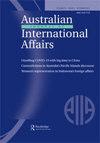Australia, Korea and the entangled language of common strategic interests
IF 1.8
3区 社会学
Q2 INTERNATIONAL RELATIONS
引用次数: 0
Abstract
ABSTRACT During the South Korean president’s state visit to Australia in December 2021, the Australian Government and in turn the Australian media sustained a narrative that the two countries held ‘common strategic interests’. Over the past ten years, the notion of common strategic interests became a ‘naturalized narrative’ in Australia – a narrative, which through entrenched repetition becomes both natural and inevitable to such an extent that counter-narratives are seen as counterintuitive and open to ridicule. This study investigates the common strategic interests narrative. It first explores the bilateral relationship and the narrative gap that occurred during the president’s visit. It then turns to the use of language and narrative in bilateral relationships. It looks at how the constituent components supporting the common strategic interests narrative are contextualized and how this impacts the political action of Australia and Korea. The study finds that the common strategic interests narrative does not cross the linguistic-cultural divide in the Australia-Korea bilateral relationship. The article concludes with policy recommendations. Australia needs to pay more attention to building policy relevance and education links in South Korea.澳大利亚、韩国与共同战略利益的纠缠语言
摘要在2021年12月韩国总统对澳大利亚进行国事访问期间,澳大利亚政府和澳大利亚媒体一直在报道两国拥有“共同战略利益”。在过去的十年里,共同战略利益的概念在澳大利亚成为了一种“归化叙事”——这种叙事通过根深蒂固的重复变得既自然又不可避免,以至于反叙事被视为违反直觉,容易被嘲笑。本研究探讨共同战略利益叙事。它首先探讨了双边关系以及总统访问期间出现的叙述空白。然后,它转向在双边关系中使用语言和叙述。它着眼于支持共同战略利益叙事的组成部分是如何被情境化的,以及这如何影响澳大利亚和韩国的政治行动。研究发现,在澳韩双边关系中,共同战略利益叙事并没有跨越语言文化鸿沟。文章最后提出了政策建议。澳大利亚需要更加重视在韩国建立政策相关性和教育联系。
本文章由计算机程序翻译,如有差异,请以英文原文为准。
求助全文
约1分钟内获得全文
求助全文
来源期刊

Australian Journal of International Affairs
INTERNATIONAL RELATIONS-
CiteScore
3.20
自引率
13.30%
发文量
44
期刊介绍:
AJIA is the journal of the Australian Institute of International Affairs. The Institute was established in 1933 as an independent and non-political body and its purpose is to stimulate interest in and understanding of international affairs among its members and the general public. The aim of the Australian Journal of International Affairs is to publish high quality scholarly research on international political, social, economic and legal issues, especially (but not exclusively) within the Asia-Pacific region. The journal publishes research articles, refereed review essays and commentary and provocation pieces. ''Articles'' are traditional scholarly articles. ‘Review essays’ use newly published books as the basis to thematically examine current events in International Relations. The journal also publishes commentaries and provocations which are high quality and engaging pieces of commentary, opinion and provocation in a variety of styles. The Australian Journal of International Affairs aims to analyse international issues for an Australian readership and to present Australian perspectives to readers in other countries. While seeking to stimulate interest in and understanding of international affairs, the journal does not seek to promote any particular policies or approaches. All suitable manuscripts submitted are sent to two referees in a full ''double blind'' refereeing process.
 求助内容:
求助内容: 应助结果提醒方式:
应助结果提醒方式:


